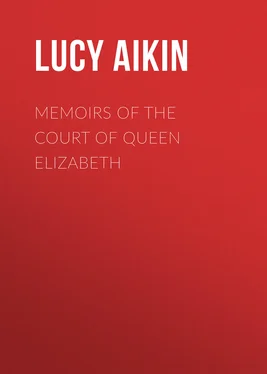Lucy Aikin - Memoirs of the Court of Queen Elizabeth
Здесь есть возможность читать онлайн «Lucy Aikin - Memoirs of the Court of Queen Elizabeth» — ознакомительный отрывок электронной книги совершенно бесплатно, а после прочтения отрывка купить полную версию. В некоторых случаях можно слушать аудио, скачать через торрент в формате fb2 и присутствует краткое содержание. Жанр: foreign_prose, История, foreign_edu, foreign_antique, на английском языке. Описание произведения, (предисловие) а так же отзывы посетителей доступны на портале библиотеки ЛибКат.
- Название:Memoirs of the Court of Queen Elizabeth
- Автор:
- Жанр:
- Год:неизвестен
- ISBN:нет данных
- Рейтинг книги:4 / 5. Голосов: 1
-
Избранное:Добавить в избранное
- Отзывы:
-
Ваша оценка:
- 80
- 1
- 2
- 3
- 4
- 5
Memoirs of the Court of Queen Elizabeth: краткое содержание, описание и аннотация
Предлагаем к чтению аннотацию, описание, краткое содержание или предисловие (зависит от того, что написал сам автор книги «Memoirs of the Court of Queen Elizabeth»). Если вы не нашли необходимую информацию о книге — напишите в комментариях, мы постараемся отыскать её.
Memoirs of the Court of Queen Elizabeth — читать онлайн ознакомительный отрывок
Ниже представлен текст книги, разбитый по страницам. Система сохранения места последней прочитанной страницы, позволяет с удобством читать онлайн бесплатно книгу «Memoirs of the Court of Queen Elizabeth», без необходимости каждый раз заново искать на чём Вы остановились. Поставьте закладку, и сможете в любой момент перейти на страницу, на которой закончили чтение.
Интервал:
Закладка:
A confession of faith was now drawn up by commissioners appointed for the purpose, and various alterations were made in the Liturgy, which had already been translated into the vulgar tongue for church use. Tests were imposed, which Gardiner, Bonner, and several others of the bishops felt themselves called upon by conscience, or a regard to their own reputation, to decline subscribing, even at the price of deprivation; and prodigious devastations were made by the courtiers on the property of the church. To perform or assist at the performance of the mass was also rendered highly penal. But no dread of legal animadversion was capable of deterring the lady Mary from the observance of this essential rite of her religion; and finding herself and her household exposed to serious inconveniences on account of their infraction of the new statute, she applied for protection to her potent kinsman the emperor Charles V., who is said to have undertaken her rescue by means which could scarcely have failed to involve him in a war with England. By his orders, or connivance, certain ships were prepared in the ports of Flanders, manned and armed for an attempt to carry off the princess either by stealth or open force, and land her at Antwerp. In furtherance of the design, several of her gentlemen had already taken their departure for that city, and Flemish light vessels were observed to keep watch on the English coast. But by these appearances the apprehensions of the council were awakened, and a sudden journey of the princess from Hunsdon in Hertfordshire towards Norfolk, for which she was unable to assign a satisfactory reason, served as strong confirmation of their suspicions.
A violent alarm was immediately sounded through the nation, of foreign invasion designed to co-operate with seditions at home; bodies of troops were dispatched to protect different points of the coast; and several ships of war were equipped for sea; while a communication on the subject was made by the council to the nobility throughout the kingdom, in terms calculated to awaken indignation against the persecuted princess, and all who were suspected, justly or unjustly, of regarding her cause with favor. A few extracts from this paper will exhibit the fierce and jealous spirit of that administration of which Dudley formed the soul.
"So it is, that the lady Mary, not many days past, removed from Newhall in Essex to her house of Hunsdon in Hertfordshire, the cause whereof, although we knew not, yet did we rather think it likely that her grace would have come to have seen his majesty; but now upon Tuesday last, she hath suddenly, without knowledge given either to us here or to the country there, and without any cause in the world by us to her given, taken her journey from Hunsdon towards Norfolk" &c. "This her doing we be sorry for, both for the evil opinion the king's majesty our master may conceive thereby of her, and for that by the same doth appear manifestly the malicious rancour of such as provoke her thus to breed and stir up, as much as in her and them lieth, occasion of disorder and unquiet in the realm" &c. "It is not unknown to us but some near about the said lady Mary have very lately in the night seasons had privy conferences with the emperor's embassador here being, which councils can no wise tend to the weal of the king's majesty our master or his realm, nor to the nobility of this realm. And whatsoever the lady Mary shall upon instigation of these forward practices further do, like to these her strange beginnings, we doubt not but your lordship will provide that her proceedings shall not move any disobedience or disorder—The effect whereof if her counsellors should procure, as it must be to her grace, and to all other good Englishmen therein seduced, damnable, so shall it be most hurtful to the good subjects of the country" &c. 15 15 Burleigh Papers by Haynes.
Thus did the fears, the policy, or the party-spirit, of the members of the council lead them to magnify the peril of the nation from the enterprises of a young and defenceless female, whose best friend was a foreign prince, whose person was completely within their power, and who, at this period of her life "more sinned against than sinning," was not even suspected of any other design than that of withdrawing herself from a country in which she was no longer allowed to worship God according to her conscience. Some slight tumults in Essex and Kent, in which she was not even charged with any participation, were speedily suppressed; and after some conference with the chancellor and secretary Petre, Mary obeyed a summons to attend them to the court, where she was now to be detained for greater security.
On her arrival she received a reprimand from the council for her obstinacy respecting the mass, with an injunction to instruct herself, by reading, in the grounds of protestant belief. To this she replied, with the inflexible resolution of her character, that as to protestant books, she thanked God that she never had read any, and never intended so to do; that for her religion she was ready to lay down her life, and only feared that she might not be found worthy to become its martyr. One of her chaplains was soon after thrown into prison; and further severities seemed to await her, when a message from the emperor, menacing the country with war in case she should be debarred from the free exercise of her religion, taught the council the expediency of relaxing a little the sternness of their intolerance. But the scruples of the zealous young king on this head could not be brought to yield to reasons of state, till he had "advised with the archbishop of Canterbury and the bishops of London and Rochester, who gave their opinion that to give license to sin was sin, but to connive at sin might be allowed in case it were neither long, nor without hope of reformation 16 16 Hayward's Life of Edward VI.
."
By this prudent and humane but somewhat jesuitical decision this perplexing affair was set at rest for the present; and during the small remainder of her brother's reign, a negative kind of persecution, consisting in disfavor, obloquy, and neglect, was all, apparently, that the lady Mary was called upon to undergo. But she had already endured enough to sour her temper, to aggravate with feelings of personal animosity her systematic abhorrence of what she deemed impious heresy, and to bind to her heart by fresh and stronger ties that cherished faith, in defence of which she was proudly conscious of having struggled and suffered with a lofty and unyielding intrepidity.
In order to counterbalance the threatened hostility of Spain, and impose an additional check on the catholic party at home, it was now judged expedient for the king to strengthen himself by an alliance with Christian III. king of Denmark; an able and enlightened prince, who in the early part of his reign had opposed with vigor the aggressions of the emperor Charles V. on the independence of the north of Europe, and more recently had acquired the respect of the whole protestant body by establishing the reformation in his dominions. An agent was accordingly dispatched with a secret commission to sound the inclinations of the court of Copenhagen towards a marriage between the prince-royal and the lady Elizabeth.
That this negotiation proved fruitless, was apparently owing to the reluctance to the connexion manifested by Elizabeth; of whom it is observable, that she never could be prevailed upon to afford the smallest encouragement to the addresses of any foreign prince whilst she herself was still a subject; well aware that to accept of an alliance which would carry her out of the kingdom, was to hazard the loss of her succession to the English crown, a splendid reversion never absent from her aspiring thoughts.
Disappointed in this design, Edward lost no time in pledging his own hand to the infant daughter of Henry II. of France, which contract he did not live to complete.
Читать дальшеИнтервал:
Закладка:
Похожие книги на «Memoirs of the Court of Queen Elizabeth»
Представляем Вашему вниманию похожие книги на «Memoirs of the Court of Queen Elizabeth» списком для выбора. Мы отобрали схожую по названию и смыслу литературу в надежде предоставить читателям больше вариантов отыскать новые, интересные, ещё непрочитанные произведения.
Обсуждение, отзывы о книге «Memoirs of the Court of Queen Elizabeth» и просто собственные мнения читателей. Оставьте ваши комментарии, напишите, что Вы думаете о произведении, его смысле или главных героях. Укажите что конкретно понравилось, а что нет, и почему Вы так считаете.












